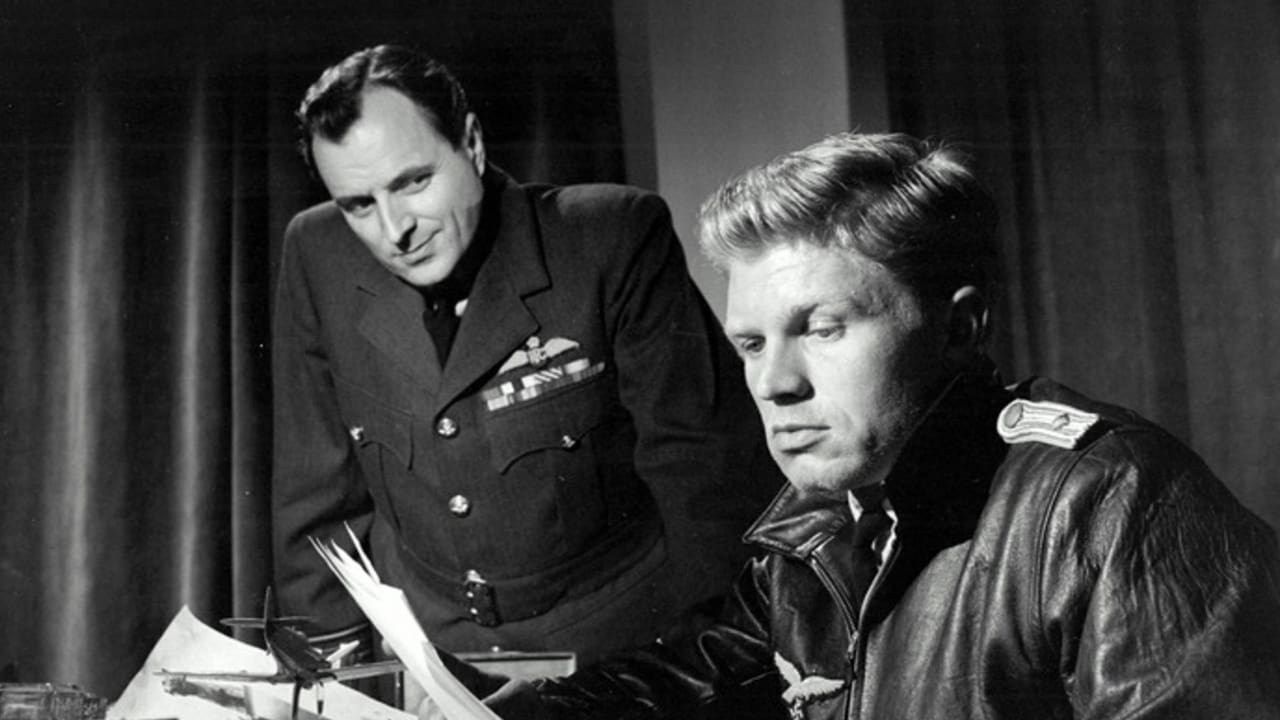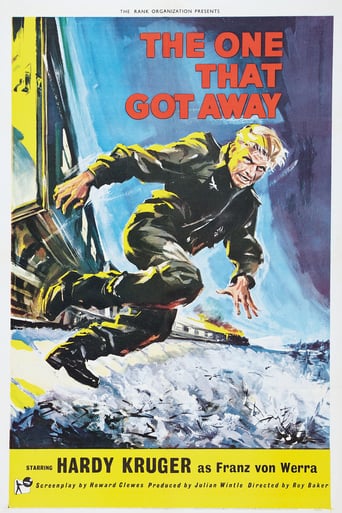

Luftwaffe PoWs are given a contemptuous reality check by a British officer after an outburst of "Seig Heils" has greeted the news of an imminent departure to Canada.For all their arrogance they are still captives and the expected Nazi invasion of England has not materialised. Oberleutnant Franz von Werra (Herr H.Kruger - himself a former Nazi) has already tried to escape on two occasions and he sees this transfer as a golden opportunity to reach a neutral United States and eventually return to Germany to continue his personal war."The one that got away" tells the story of this brave,determined and resourceful pilot who eventually did manage to make a "Home Run" only to be killed in action a few months later,but not before supplying his superiors with vital information about the methods of British Military Intelligence. By any reasonable standard Oberleutnant von Werra was an heroic figure,but,as portrayed by Herr Kruger he was not overconcerned with displays of false modesty nor overburdened with conscience where making false claims of aerial victories.Nevertheless Kruger succeeds in making von Werra a figure one could sympathise with if not actually like. Set mainly in the Lake District and the more remote parts of the midlands,the movie shows an England struggling to sustain "total war" single-handedly,bombed incessantly by the Luftwaffe in the prelude to invasion and desperately depending on "The Few" to defend it whilst most of its young men were fighting for their lives in Northern France. The soldiers left behind to guard the PoW camps were often the old,the lame and the halt,only the remoteness of their locations kept a mass exodus at bay. The British are generally shown as rather a smug lot,complacent rather than over confident of victory,as if no other result were thinkable. Very fortunately for them Japan would eventually play into America's hands and from the "Day of Infamy" onwards the top ranks in the German High Command realised the inevitability of the final outcome. But in the heady days of 1940,the ill-starred von Werra and his colleagues looked forward to marching down Pall Mall in a Victory Parade that might well have presaged the beginning of the "Thousand Year Reich". But,tenacious and bloody-minded,the Brits hung on and history took its course. One suspects that von Werra,as his plane span out of control into the sea,might have wished he had seen the war out in the safety of a PoW camp in Canada - but - on the other hand,the brave and dedicated warrior that he was,he might have been content to have died for his Fatherland.What a terrible waste it all was.
... View MoreThis is the true story of the only German POW to successfully escape from British custody during World War II. Since it is a true story and those who made it had a great regard for the facts, it was not only very watchable but compelling because this German actually went through such extreme lengths to escape. During the film, he actually escapes three times. The final time was successful and is amazing when you consider that many men would have died during his insane trek through Canada during the winter!! An amazing story of human endurance and dedication--even if he did fight for the bad guys!! As a history teacher and lover of old films, this film was a natural choice for me. The story is odd but true and highly watchable--if this is the sort of film you are inclined to watch. Unfortunately, while I liked it and many others will, it's exactly the sort of film I have a hard time believing teens or young adults would generally enjoy. There are no special effect--just some tense moments as you follow the First Lieutennant on his journey to freedom. However, a patient person will be amply rewarded by an excellent and very unusual film and I can't think of another quite like it.
... View MoreThis is one of the better WWII movies about an escape from a prisoner-of-war camp. The story is taut and suspenseful. The odds against success are high but we wind up rooting for the man anyway. The guy is handsome, competent, resourceful and self-confident to the point of smugness. No, the guy isn't played by Steve McQueen. There is no ball-bouncing in a prison cell. The man is Oberleutnant Franz von Werra, played by the German actor Hardy Kruger. Von Werra's Messerschmitt is shot down over England on September 5, 1940. He is captured, interrogated and sent to a prisoner of war camp for officers. He turned out to be the only German captured on British soil who ever escaped and made it back to Germany. Von Werra turns out to be a committed German officer, determined to escape, and with enough drive, ingenuity and luck to escape from British camps three times. The first time sees him staggering for five days through mud and freezing rain to try to reach a British port and a neutral ship. When he's finally recaptured he's half dead. The British send him to a much tougher camp in the north. This time he organizes a tunnel dig, figures out how to make fake identity discs and how to convert rag-tag clothing into something passably civilian. On this break von Werra manages to talk himself onto a RAF base posing as a Dutch pilot. He's captured while seated in the cockpit of a Hurricane trying to get it started. He planned to fly back to Germany. Now the British ship him off to a prisoner-of-war camp in Canada. They figure that'll take the starch out of his determination to return to Germany. They didn't figure that von Werra would realize the significance of the United States being a neutral country and how close the train taking him to the camp would be to the Saint Lawrence River border. Sure enough, in the dead cold of a Canadian winter (January, 1941), he escapes from the train, works his way through the snow and freezing drizzle to the mostly frozen river. He finds a boat and finally is picked up on the American side. Our movie ends here, with a big smile on von Werra's frozen face and mumbled "thank yous" to the American border guard who found him. Through all of this the escapes are carefully shown with a lot of dramatic tension. You can't help but wind up hoping von Werra's persistence will pay off. Knowing he's an enthusiastic German pilot, a fighter ace, who is eager to get back to the battles takes a little of the edge off, but still... The One That Got Away is filmed in black and white. There are no sweeping, beautiful shots of the countryside. We're talking late fall and winter in Britain and Canada. It's cold and grey. If it's not snowing, it's raining. If it's not raining, it's drizzling. If it's not drizzling it's still so cold you'll want a fire going during the day. The acting is as cool and competent as the movie. And what about von Werra after he made it to America? The Canadians tried to get him back. The Americans wanted to send him back. While everyone was arguing his status, von Werra slipped across the U. S. border into Mexico, then made his way back to Germany by way of Peru, Bolivia, Brazil and Spain. He arrived in Berlin on April 18, 1941. He was assigned to fly on the Eastern front, became an ace again, then was sent with his unit to the Netherlands for rest and refitting. On October 21, 1941, his plane malfunctioned during a training flight and went down in the sea. His body was never recovered. Franz von Werra's luck had finally run out.
... View MoreI was lucky to find a DVD of this film. In my memory the film was excellent and seeing it again after 30 years or so I was not disappointed. As an escape film it works beautifully. Someone tries - and in the end succeeds, as the title suggests - to escape from prison camp. What makes this film special is that it is a German who is portrayed as the hero. As a child it was the first time that I ever saw a war movie with a Good German in it (or at the very least not a bad and/or stupid one). Hardy Krüger was of course brilliant and he later did a similar job in Flight of the Phoenix where he played an arrogant but in the end sympathetic German. And the film does not even make the soldier a secret enemy of the Nazi regime. He is portrayed as a loyal German soldier who sees it as his duty to escape and to continue fighting the allies. For me to see that English film makers where able to make a film like this made me very optimistic. They avoid using clichés. And funny enough, they confirm the cliché about the English, namely that they are fair and good sportsmen, because that's what we have here. A game where the object is to escape from prison. A German wins and this is what we see. Thank you.
... View More